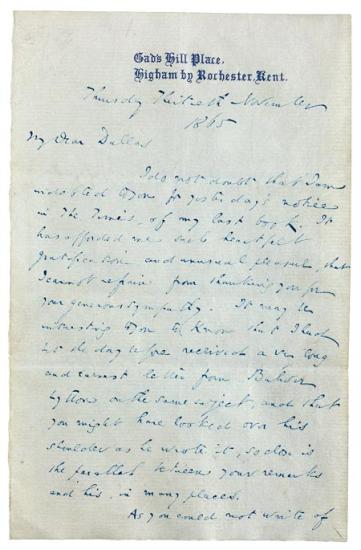
Autograph letter signed, Higham, 30 November 1865 to Eneas Sweetland Dallas
Acquired by Pierpont Morgan before 1913
In his review of Our Mutual Friend for The Times, E. S. Dallas commented that Dickens was not only "the most extraordinary genius" but also "the most careful and painstaking in his work." The sensitivity of Dallas's appreciation of the novel appealed so much to Dickens that he presented his manuscript to the reviewer, telling him in this letter: "you could not write of my work of love in such a way, without thoroughly knowing what I would feel in reading your words... . But as you have divined what pains I bestowed upon the book, perhaps you might set some little value on the Manuscript, as your corroboration... and... as a token of my grateful regard."
Story Weaver
The gestation period of Our Mutual Friend, Dickens's last completed novel, was protracted and frustrating. He decided upon the title in 1860 or 1861, invented the names of several characters, and devised some possible plot trajectories. During the summer of 1862, he told Wilkie Collins that, "sometimes, in a desperate state, I seize a pen, and resolve to precipitate myself upon a story. Then I get up again with a forehead as gnarled as the oak tree outside the window, and find all the lines in my face that ought to be on the blank paper." It was not until a further year and a half later that Dickens could report to Collins that he had completed the first two monthly parts of his next serialized novel, and admitted that he felt "quite dazed in getting back to the large canvas and the big brushes." Dickens had to work "like a dragon" to complete Our Mutual Friend by 2 September 1865. Commenting on the difficulties of the novel's complex, interconnected plot, Dickens characterized himself as "the story-weaver at his loom."
My Dear Dallas
I do not doubt that I am indebted to you for yesterday's notice in The Times, of my last book. It has afforded me such heartfelt gratification and unusual pleasure, that I cannot refrain from thanking you for your generous sympathy. It may be interesting to you to know that I had but the day before received a very long and earnest letter from Bulwer Lytton on the same subject, and that you might have looked over his shoulder as he wrote it, so close is the parallel between your remarks and his, in many places.
As you could not write of
